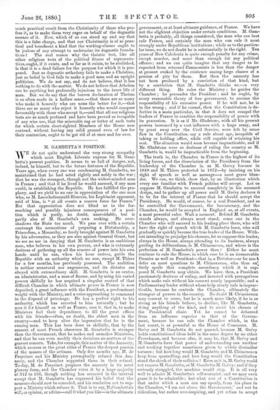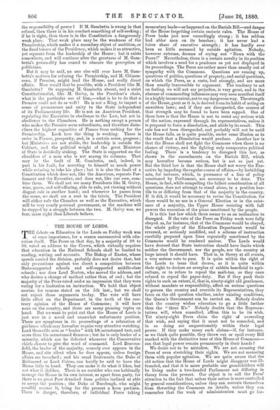M. GAMBETTA'S POSITION.
WE do not quite understand the very strong sympathy which most English Liberals express for M. Gam- betta's present position. It seems to us full of danger, not, indeed, to himself, but to the future fortunes of the Republic. Years ago, when every one was condemning M. Gambetta, we maintained that he had acted rightly and nobly in the war ; that be was the strongest, though not the widest-minded man in France ; and that if he lived he would succeed, if any man could, in establishing the Republic. He has fulfilled the pro- phecy, and we yield to no one in appreciation of the one man who, as M. Larochefoucauld-Bisaccia, his Legitimist opponent, said of him, is " at all events a reserve force for France." But that appreciation does not blind us to the far- reaching and possibly injurious consequences of a posi- tion which is partly, no doubt, unavoidable, but is partly also of M. Gambetta's own seeking. He over- shadows the State too much. We pass over with a certain contempt the accusations of preparing a Dictatorship, a Princedom, a Monarchy, so freely brought against M. Gambetta by his adversaries, as they are also against General Grant, but we see no use in denying that M. Gambetta is an ambitious man, who believes in his own powers, and who is extremely desirous of gathering up all the sources of power into his own hands until he can, when his hour arrives, guide the Republic with an authority which no one, except M. Thiers for a few months, has previously possessed. The ambition is neither unnatural nor ungenerous, and its dictates are obeyed with extraordinary skill. M. Gambetta is an orator, an administrator, and a man of finesse, and by using his varied powers skilfully he has acquired a singular control of that difficult Chamber in which ultimate pcwer in France is now deposited, a great influence with the President, a predominant weight with the Ministry, and a voice approaching to command in the disposal of patronage. He has a perfect right to his
authority, which has accreted to him naturally ; but he uses it for himself as well as France, uses it, that is, to make Ministers feel their dependence, to fill the great offices with his friends—often, no doubt, the ablest men in the country—and to keep alive the impression that he is the coming man. This has been done so skilfully, that by the consent of most French observers M. Gambetta is stronger than the Government, that he makes and unmakes Ministries, and that he can even modify their decisions on matters of the gravest concern. Take, for example, this matter of the Amnesty, which arouses in the great cities of France the deepest passion of the masses of the artisans. Only five months ago, M. de Freycinet and his Ministry peremptorily refused this Am- nesty, and the Chamber supported them in their refusal.
To-day, M. de Freycinet proposes the amnesty in its most
plenary form, and the Chamber votes it by a huge majority of 312 to 136, though nothing has occurred in the interval except that M. Gambetta has expressed his belief that the measure should now be conceded, and his resolution not to sup- port a Ministry which refuses it. That is to say, M.pambetta's will, or opinion, or advice—call it what you like—is the ultimate government, or at least ultimate guidance, of France. We have not the slightest objection under certain conditions. M. Gam- betta is probably, all things considered, the man who can best rule France, and certainly the man who can rule it most strongly under Republican institutions ; while as to the particu- lar issue, we do not doubt he is substantially in the right. Ten years of New Caledonia is quite enough penalty for any crime, except murder, and more than enough for any political offence; and we can quite imagine that any danger to be expected from returned Communists is less than the danger at present evoked by the existence among large classes of a passion of pity for them. But then the amnesty has not been produced by a conviction of that kind, but by a conviction that M. Gambetta thinks so,—a very different thing. He rules the Ministry ; he guides the Chamber ; he persuades the President ; and he ought, by every reasonable theory of free government, to assume the responsibility of his excessive power. If ho will not, he is in the wrong ; and if he cannot, then the Constitution is de- fective in a main particular, in that it does not compel the leaders of France to combine the responsibility of power with its possession. It is as if Mr. Gladstone, with all his present powers increased by a vast influence with a huge army, and by great sway over the Civil Service, were left by some flaw in the Constitution, say a rule about age, incapable of taking or holding office, while still capable of retaining his seat. The situation would soon become impracticable, and if Mr. Gladstone were as desirous of ruling the country as M. Gambetta is, would be impracticable from the beginning.
The truth is, the Chamber in France is the highest of its living forces, and the dissociation of the Presidency from the leadership of the Chamber is, as M. Gravy foresaw in 1848 and M. Thiers protested in 1872—by insisting on his right of speech as well as message—a most grave blun- der. We can, we think, show that, by an illustration which every one familiar with French politics will accept. Let us suppose M. Gambetta to succeed completely in his assumed design, and to gather up all power until M. Gravy declares it to be for the interest of France that he should accept the Presidency. He would, of course, be a real President, and as he controlled the Government, the bureaucracy, and the Chamber, he would be accepted in England as, at all events, a most powerful ruler. Wait a moment. Behind M. Gambetta stands always, and always must stand, some one in the Chamber who will succeed to his leading place there, who will have the right of speech which M. Gambetta loses, who will gradually or quickly become the true leader of the House. With- out intending to prejudge his chances, let us suppose this leader, always in the House, always attending to its business, always guiding its deliberations, is N. Clemenceau, and where is the perfection of M. Gambetta's power then ? Either he must continue to rule the House, in which case he is an irremovable Premier as well as President—that is, a Dictator—or he mutt defer on most questions to M. Clamenceau, who thus en tirely spoils that complete ascendancy which it is sup- posed M. Gambetta may obtain. We have, then, a President passionately desirous of ruling, and invested with prerogatives which make rule without his consent nearly impossible; and a Parliamentary leader without whose help steady rule is imprac- ticable, because he controls the Chamber, ultimately the strongest of powers in the country. No doubt M. Clamenceau may consent to serve, but he is much more likely, if he is as strong as his friends believe, to decline, like M. Gambetta, doing anything of the kind, and to await his chance of the Presidential chair. Yet he cannot be debarred from an influence superior to that of the Govern- ment, because he can rule the Chamber which, in the last resort, is as powerful as the House of Commons. M. Gravy and M. Gambetta do not quarrel, because M. Gravy holds constitutional ideas held in the same degree by no other Frenchman, and because also, it may be, that M. Gravy and M. Gambetta have that power of understanding one another and working together sometimes given to widely dissimilar natures ; but how long would M. Gambetta and M. Clamenceau keep from quarrelling, and how long would the Constitution stand the shock of their collision ? Even as it is, M. Gravy could not remove M. Gambetta, or M. Gambetta M. Gravy; and if they seriously struggled, the machine would stop. It is all very well to admire M. Gambetta's self-restraint, and we may even grant it to be admirable ; but what sort of a Constitution is that under which a man can say openly, from his place in the Chamber, "I am not above the Government," and not be ridiculous, but rather awe-inspiring, and yet refuse to accept
the responsibility of power ? If M. Gambetta is wrong in that refusal, then there is in his conduct something of self-seeking ; if he is right, then there is in the Constitution a dangerously weak place. That weak place may be the weakness of the Premiership, which makes it a secondary object of ambition, or the fixed tenure of the Presidency, which makes it so attractive, yet separate from the leadership of the House ; but it exists somewhere, and will continue after the greatness of M. Gam- betta's personality has ceased to obscure the perception of politicians. But it may be said, no one else will ever have M. Gam- betta's motives for refusing the Premiership, and M. Clemen- ceau, if Premier, might lead the House, and really direct affairs. How would that be possible, with a President like M. Gambetta ? Or supposing M. Gambetta absent, and a strict Constitutionalist, like M. Grevy, in the President's chair, what is the particular use of him,—what is he to do that a Premier could not do as well ? He ia not a King, to impart a sense of permanence and unity to the State independent of its Parliamentary life. He is not an American President, regulating the Executive in obedience to the Law, but not in obedience to the Chambers. He is nothing except a person who makes the Premier seem subordinate, and therefore disin- clines the highest capacities of France from seeking for the Premiership. Look how the thing is working. There is order in France, prosperity, and, in a certain sense, progress ; but Ministries are not stable, the leadership is outside the Cabinet, and the political weight of the great Ministers of State is decidedly sinking. The State is supported on the shoulders of a man who is not among its columns. That may be the fault of M. Gambetta, and, indeed, in part is his fault, for accreting to himself so much power while refusing to take his place ; but it is also the fault of a Constitution which does not, like the American, separate Par- liament and the Executive, and does not, like our own, com- bine them. We shall not see many Presidents like M. Grevy, wise, grave, and self-effacing, able to rule, yet viewing without disgust rule in another hand ; and whenever he passes from the scene, we shall see a rent in the fabric. The President will either rule the Chamber as well as the Executive, which will be very nearly personal government, or the machine will be stopped by a struggle between the two. M. Grevy was, we fear, more right than Liberals believe.



































 Previous page
Previous page